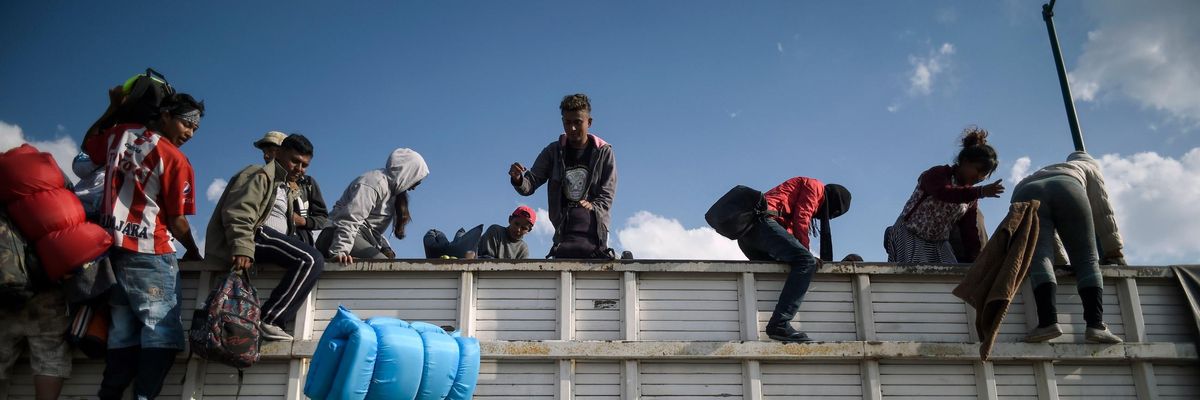A leading refugee advocacy organization on Monday published a report outlining ways in which the Biden administration can help people displaced by the ever-worsening climate emergency find safety.
"The U.S. government has many tools that it can use now to make a meaningful impact on the lives of climate-displaced people."
--IRAP report
The report (pdf), entitled U.S. Opportunities to Address Climate Displacement, was published by the International Refugee Assistance Project (IRAP), with the endorsement of six groups: Amnesty International, Mayors Migration Council, Natural Resources Defense Council, Truman National Security Project, University Network for Human Rights, and Welcoming America.
The paper's publication is timed to coincide with an upcoming report--ordered by U.S. President Joe Biden in February and led by the office of National Security Adviser Jake Sullivan--on "options for protection and resettlement of individuals displaced directly or indirectly from climate change."
According to the IRAP report, "There are existing U.S. legal tools and international and regional legal norms that the U.S. government can build upon to expand protection for climate-displaced people."
Some of the report's key recommendations include:
- Recognizing climate-displaced people as refugees under the current U.S. refugee definition;
- Broadening eligibility for Temporary Protected Status (TPS) to include people displaced by climate change; and
- Joining and supporting regional allies in protecting people fleeing environmental disasters.
"Climate change is a lead driver of displacement. Recognizing this, the global community is increasingly working to provide climate-displaced people with protection and pathways to safety," the report states. "The U.S. interagency report on climate displacement is a crucial first step in positioning the United States to join this global effort."
The report examines several case studies, including Francisco and Jose, two Afro-Indigenous Garifuna minors from Honduras who were granted asylum in the United States, and Isabel, an Indigenous Honduran land defender who was kidnapped, beaten, and sexually assaulted in order to coerce her to sign over tribal lands.
After her young daughter was murdered, Isabel was granted asylum in the U.S. "on the basis of ethnic discrimination, political persecution, and membership in the particular social groups of environmental defenders, activists, and Indigenous leaders."
According to the report:
As Francisco, Jose, and Isabel's stories suggest, people displaced in part because of climate-related pressures can qualify as asylees under existing U.S. law. The Refugee Act of 1980 defines a refugee as a person with a well-founded fear of persecution based on five categories: race, religion, nationality, membership in a particular social group, or political opinion.
In recent guidance interpreting the refugee definition used by the United States and other countries, the United Nations High Commissioner for Refugees (UNHCR) recognized that climate change and environmental harm frequently "interact with other drivers of displacement" that fit into the established refugee definition.
But this interaction may not always be obvious, and when working under intense time pressure, [United States Citizenship and Immigration Services] officers and immigration judges may miss people with valid claims. Thus, U.S. adjudicating officers should be attuned to how climate change and environmental stressors might contribute to a well-founded fear of persecution for people of varying race, ethnicity, religion, politics, gender, or social groups.
"The U.S. government has many tools that it can use now to make a meaningful impact on the lives of climate-displaced people," the paper says. "Following the release of the interagency report, IRAP calls on the U.S. government to leverage these tools immediately in the service of climate-displaced people, such as Francisco, Jose, and Isabel."
Ama Francis, climate displacement project strategist at IRAP, said in a statement that "as climate change worsens and its impact on displacement intensifies, it is crucial that the White House take the necessary steps to fill the legal voids preventing climate-displaced people from finding a viable home."
"As climate change worsens... it is crucial that the White House take the necessary steps to fill the legal voids preventing climate-displaced people from finding a viable home."
--Ama Francis, IRAP
Denise Bell, researcher for refugee and migrant rights at Amnesty International USA, said her group "joins with IRAP and partners in urging the Biden administration to use the tools at hand to address climate displacement."
"Ready solutions are available to address root causes and displacement that are centered in human rights and humanitarian protection," Bell added. "The U.S. should act quickly to ensure welcome and security for climate-displaced people."
The new report comes as human rights groups including ACLU, Oxfam, and Raices announced Monday that they are suing the Biden administration for allegedly denying due process to migrants by using a provision known as Title 42 to fast-track deportations of asylum-seekers and other immigrants under the pretext of the Covid-19 pandemic.
The Biden administration has turned away most migrants presenting themselves at the southern U.S. border under the policy, while leading administration officials including Vice President Kamala Harris and Homeland Security Secretary Alejandro Mayorkas--a refugee himself--have warned would-be migrants that they are not welcome in the United States.
"We gave the Biden administration more than enough time to fix any problems left behind by the Trump administration, but it has left us no choice but to return to court," said the ACLU's Lee Gelernt, who is the lead attorney on the case. "Families' lives are at stake."

